|
|

|
  
Features
Update 2018/8/17
Science
SPEAK TO YOUR AUDIENCE, AN ARTISTIC APPROACH TO SHARING SCIENTIFIC INFORMATION
This story is brought to you in part by

By Cori Marshall
Scientists are always eager to share their findings, though there are times when the message does not get across clearly to the general public. It tends to get wound up in the profession's jargon and technical terms, which may or may not be understood. This could be problematic, especially if the message concerns something as important as climate change or sea level rise.
This is not to say that the non-scientific community does not speak from its own place of specialization, where terms are not readily comprehended outside of the profession. But is there a way to break down those barriers, and have audiences hanging on every scientific word?
There is an organization that is taking this question to heart, and WaterToday had the opportunity to speak to the President and Co-Founder of Beakerhead, Mary Anne Moser.
Moser is trained in science and has worked in the arts so is familiar with both worlds. She desired to create something where you didn't have to choose, a way that combines science and creativity, and a huge part of that world is communication," she said.
Beakerhead, the organization that Moser co-founded, runs many programs and workshops. "For the past 10-12 years we have been running a science communication program, and just in recent years we have started to run them across the country," Moser said.
"We do it because we are trying to bring science and engineering into mainstream culture in a way that's welcoming for audiences."
Mary Anne Moser, President and Co-Founder of Beakerhead
"There are no real implicit rewards in science for spending time getting good at communicating," Moser explained. This is precisely where Beakerhead comes in to "provide an incentive to do that, [it] is a platform for scientists and engineers who want to engage people."
The approach that Beakerhead takes is borrowed from the entertainment industry. Moser said that "it comes from an audience-focus way of working, and that always works if you don't have their attention you can't have a conversation."
Moser said that "scientists are compelled to share their content, however people might not be listening, and scientists aren't trained to check and see if people are listening." She believes that the breakdown is that "science communication is driven by science," and it should be driven by the communication.
"Once you are engaged in a conversation, then you can engage with the science," Moser said. The approach that Moser is talking about is based on a conversation, "whether it be a one on one adult conversation, or one to 200 thousand through a television."
When asked if she believes that the public gets lost in the terminology, Moser responded "absolutely," adding "that is the easiest thing to change."
"Scientists have to use jargon because it is the language of the trade," Moser said. Now jargon is inherent to any profession, "you have a specialized language that you use with your peers, and that's fine, you need a different language when talking to a mainstream audience," Moser underlined.
“For a scientist, a mainstream audience can be somebody just down the hall from you," she said, alluding to the fact that a shorthand language does not always cross scientific disciplines.
"When you are using specialized terminology, you are not thinking about who you are talking to, because if you did you would realize that they don't know those terms."
Mary Anne Moser, President and Co-Founder of Beakerhead
The process is about building an audience and begins with asking "why would anyone care," Moser said. For a water researcher finding that reason isn't hard, everyone has a reason to care about water. "When you can start to open up a conversation about things that matter to [the audience], you can pique their curiosity about what can be done," Moser explained.
It is not a natural process for the scientists, Moser is "really impressed by their ability to do that, but has also noted how easy it is to slip back into a science context." The organization relies on the expanding network of those who understand how easy it is to slip into a specialized presentation, "when you go back to your home context you have a support network."
Getting the importance of scientific research across to the public is vital. Doing so in a manner that captivates the audience may only be as simple as having a conversation and understanding who you are talking with.
cori.m@watertoday.ca
|
|
|
Have a question? Give us a call 613-501-0175
All rights reserved 2025 - WATERTODAY - This material may not be reproduced in whole or in part and may not be distributed,
publicly performed, proxy cached or otherwise used, except with express permission.
|
| |